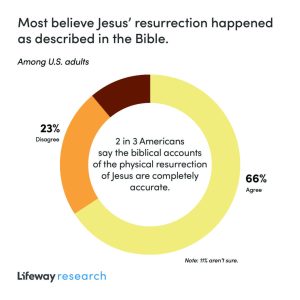Most Americans believe Jesus rose from the dead on the first Easter Sunday. They’re just not sure it matters much.
Two-thirds of U.S. adults (66 percent) say the biblical accounts of the physical resurrection of Jesus are completely accurate. They believe this event actually occurred, according to the 2022 State of Theology study. Fewer than a quarter (23 percent) disagree, and 11 percent say they’re not sure.
The percentage that affirms the bodily resurrection of Jesus as described in the Bible is unchanged since 2018 and within two percentage points of where it has been since the first State of Theology in 2014.
Jesus’ Easter resurrection is more accepted in the Midwest (70 percent) and South (70 percent). But majorities in both the West (62 percent) and Northeast (60 percent) also affirm it.
Younger Americans are the least likely age group to say they believe in a historical resurrection. Still, 58 percent of those 18-34 accept it as fact.
Self-identified Evangelicals (90 percent) and Black Protestants (89 percent) are more likely to affirm Jesus’ resurrection than Catholics (79 percent) and mainline Protestants (74 percent).
Americans with Evangelical beliefs are more likely than those without such beliefs to accept the resurrection (98 percent v. 58 percent).
Nine in 10 Americans who attend a religious service at least monthly (90 percent) say they believe the biblical accounts of Jesus’ resurrection. One of the few demographics in which a majority don’t believe is those who attend religious services less frequently. Less than half of those who attend less than monthly (48 percent) affirm the belief.
Lacking a biblical foundation
Despite accepting the biblical accounts of Jesus’ resurrection, many Americans have conflicting thoughts about the Bible and seem to see little connection between Jesus rising again and their daily lives.
In 2022, for the first time in the history of the State of Theology study, a majority of Americans (53 percent) say the Bible, like all sacred writings, contains helpful accounts of ancient myths but is not literally true. And 40 percent, the highest percentage yet, say modern science disproves the Bible.
A growing percentage, up to a high of 32 percent, says God is unconcerned with their day-to-day decisions. And 3 in 5 (60 percent) say religious belief is a matter of personal opinion, not objective truth.
Yet also for the first time, a majority (51 percent) say the Bible is 100 percent accurate in all it teaches. And 52 percent say the Bible has authority to tell us what we must do. Around 3 in 5 (62 percent) say the Bible is the highest authority for what they believe.
Life-changing truth
For author and apologist Rebecca McLaughlin, this represents an opportunity but also gives a troubling realization.
“First, I feel hopeful, because it suggests that twice as many Americans attend church weekly might be open to doing so if they were invited. This is a huge opportunity,” said McLaughlin who is the author of Confronting Christianity: 12 Hard Questions for the World’s Largest Religion. “Church attendance isn’t the ultimate goal, of course. But connecting these people, who must on some level think they are Christians, with regular Bible teaching and real Christian community would be a major step toward them trusting in Christ.”
But McLaughlin said she also feels “heartbroken because the idea that someone would say they believe Jesus actually rose from the dead but that this belief would have so little impact on their life that they weren’t even part of a church is truly tragic. This exposes the danger of ‘cultural Christianity’—the vague assent to Christian beliefs without any evidence of actual faith in Christ.”
This may change how people think about reaching out to non-Christians. “Traditionally, one big focus of apologetics has been arguments for the bodily resurrection of Jesus,” she said.
“But the 66 percent of Americans who say they believe this don’t need those arguments,” McLaughlin continued. “Instead, they need to understand what difference it makes that Jesus rose from the dead. We need to show them that it makes all the difference in the world. And that if Jesus is risen, He is also Lord.”






